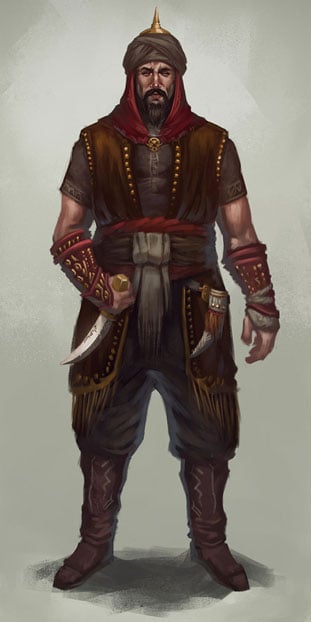Masyaf Castle, the Seat of the Assassins
Fans of the popular video game series Assassin’s Creed would be familiar with the castle of Masyaf in Syria. In the series, the castle of Masyaf was the headquarters of the notorious Assassins, and this is not fiction - Masyaf was indeed once home to the much feared ancient order of assassins.
During the late 11th century, an order of Nizari Ismailies was formed in Persia and Syria by a man called Hassan-i Sabbah. These were the notorious Hashshashins who captured many mountain fortresses and posed a threat to Sunni Seljuk authority in Persia. Perhaps the Hashshashin, from which the name ‘assassins’ derives, were most famous for the way they got rid of their opponents – through highly-skilled assassinations.
Based on archaeological evidence, it has been suggested that the castle of Masyaf was built during the time of the Byzantines, constructed on top of a natural limestone hill that rose above the surrounding plain and village. This gave the castle a strategic position which allowed its occupants to oversee and control the region. The Assassins first occupied the castle in A.D. 1141 when they captured it from the Sanqur, who held it for the Banu Munqidh of Shayzar, one of the petty Islamic dynasties in the region during the 12 th century A.D.

The castle of Masyaf as it stands today. Source: Wikipedia
The Assassins were notorious throughout the region for their efficiency at dispatching their enemies. This gave them a degree of political power that some of the bigger powers in the Middle East were not comfortable with. Thus, Masyaf became a target for those who were brave enough to make an attempt at breaking the power of the Assassins. This endeavour was undertaken by no less an illustrious character as Saladin, the first Sultan of Egypt and Syria and the founder of the Ayyubid dynasty.
Saladin’s siege of the castle in 1176 A.D., however, ended in failure. According to legend, while Saladin was asleep beneath Masyaf, an Assassin managed to infiltrate his tent. Saladin awoke to catch a glimpse of this figure as he was leaving the tent. A poisoned cake or hot scones with a poisoned dagger were left on the side of Saladin’s bed. This pastry was accompanied by a note warning Saladin that he would be killed if he did not withdraw. Fearing for his life, Saladin chose to make peace with the Assassins.

‘Saladin the Great’ by DanarArt
Nevertheless, the Assassins were not invincible. In 1260 A.D., Masyaf and three other Assassin fortresses surrendered to the invading Mongols. The Mongol victory was short-lived, however, as they were defeated by the Mamelukes at the Battle of ‘Ayn Jalut in the same year. Once the Mongols were expelled from Syria, the Assassins were back in control of Masyaf. Ten years later, the Mamelukes under their sultan, Baibars, took control of Masyaf. Whilst the Assassins eventually disbanded, the castle remained a part of the landscape.
In 2000, conservation work began on the castle of Masyaf. This project, completed in 2006, has consolidated and restored the crumbling structure. Moreover, it has provided us with a much better understanding of the Assassins when they occupied the castle. For instance, the project discovered a tunnel that is believed to have been a secret escape passage. In addition, a system of channels designed to carry rain water into cisterns beneath the castle was also uncovered. This is further evidence that the castle was designed to withstand long periods of enemy siege. Yet, the castle is not without its luxuries, as attested by the finding of a traditional bath house.

Tunnel inside Masyaf Castle. Image source: TripAdvisor
It may be worth pointing out that the castle of Masyaf does not exist as an isolated point in the landscape, but co-exists with the neighbouring old city of Masyaf. Thus, the conservators, who took into account the urban context of the castle, made an effort to conserve and enhance the old city, upgraded the markets and pedestrian areas and created more attractive facilities for tourists. By taking these measures, the local population would benefit from the tourism industry, and would probably work to preserve the castle, as they have a stake in it. Thus, by involving the local population, such ancient monuments may be protected for future generations to come.
Featured image: ‘Masyaf’ by Raphael-Lacoste
By Ḏḥwty
References
Atlas Obscura, 2014. Musyaf Castle. [Online]
Available at: http://www.atlasobscura.com/places/castle-of-musyaf
Perry, T., 2007. Secrets of Assassins' Fort Unearthed in Syria. [Online]
Available at: http://www.reuters.com/article/2007/07/13/us-syria-castle-assassins-idUSL1114464920070713
Submissions, 2012. Historical Accuracy of Video Games: Assassin’s Creed’s Masyaf. [Online]
Available at: http://www.hbhud.com/2012/03/02/historical-accuracy-of-video-games-assassins-creeds-masyaf/
Tharoor, I., 2012. State of War: Syria’s Crusader Castles and Medieval Fortresses. [Online]
Available here.
The Institute of Ismaili Studies, 2013. Castle of Masyaf. [Online]
Available at: http://www.iis.ac.uk/view_article.asp?ContentID=105103
Wikipedia, 2014. Assassins. [Online]
Available at: http://en.wikipedia.org/wiki/Assassins
Wikipedia, 2014. Masyaf. [Online]
Available at: http://en.wikipedia.org/wiki/Masyaf
Wikipedia, 2014. Masyaf Castle. [Online]
Available at: http://en.wikipedia.org/wiki/Masyaf_Castle
www.akdn.org, 2014. The Citadel of Masyaf. [Online]
Available at: http://www.akdn.org/publications/hcp_syria_brief4.pdf




















Comments
Well I believe there wouldn't be any or as many if America (and the West)
had stayed out of their countries and not raped murdered their women and children and and pillaged the natural resources
No I'm pretty sure it's Islamic hardliners actually.
And you can thank the number one terrorist regime (USA) for that
Fascinating. I love the Assassin's Creed games, it's good to see old Masyaf getting fixed up. Involving the locals is brilliant, I hope it works. The problem is, there aren't a lot of tourists willing to go to Syria right now.